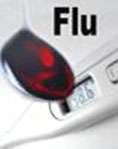Many flu infections aren't good match for vaccine: CDC

(HealthDay)—The flu is starting to tighten its grip on much of the United States, particularly in the South and Midwest, U.S. health officials reported Thursday.
And more than half of the flu infections examined so far have been caused by the strain known as influenza A H3N2, which appears to have mutated from the H3N2 strain included in this year's flu vaccine.
That mutated strain has federal officials concerned because the vaccine may not offer the protection seen in seasons when the vaccine is a better match.
Still, health officials are urging that everyone over 6 months of age get vaccinated, because the vaccine will offer some protection, especially for strains that might become more widespread as the flu season progresses.
"Vaccination is our most effective means to prevent influenza and its complications," said Melissa Rolfes, an epidemic intelligence service officer with the U.S. Centers for Disease Control and Prevention. "We encourage everybody over the age of 6 months to get vaccinated," she said.
"Currently," added Rolfes, who authored Thursday's report, "flu activity in the United States is low, but it's increasing."
Flu seasons that feature widespread H3N2 infections can be tough. H3N2 viruses were predominant during the 2012-13, 2007-08 and 2003-04 flu seasons—the three seasons with the highest death rates in the past decade, CDC officials noted. In the past, death rates from H3N2 have been more than double that of other flu strains.
Rolfes said H3N2 flu tends to affect the old and the very young. "In previous seasons where H3N2 has been the predominant virus, we do tend to see more deaths among older adults and also very young children," she said.
For the week ending Dec. 6, widespread flu activity was reported in Colorado, Delaware, Florida, Georgia, Illinois, Kentucky, Louisiana, Maryland, Minnesota, New York, North Carolina, Ohio, Pennsylvania and Texas, according to the report, published in the CDC's Morbidity and Mortality Weekly Report.
Rolfes said it's difficult to predict whether this will be a bad flu season, but there have been no signs yet that it will be severe.
However, Dr. Marc Siegel, an associate professor of medicine at NYU Langone Medical Center in New York City, said it could be a rough ride for the next few months. "The combination of a H3N2 [strain] that is a predominant strain and a vaccine that may not be a perfect match may make it a severe flu season," he said.
Despite the vaccine mismatch, Siegel also recommends that everyone get vaccinated. The reason: although the H3N2 virus in circulation is slightly different genetically than the one in the vaccine, the vaccine may still be somewhat effective.
"We are not going to know how valuable the shot is until March or April. The goal is to have fewer people hospitalized and fewer people seen in emergency rooms, and that isn't known yet," he said.
Siegel expects this year's flu season to peak by late January or February.
Many school districts are already paying a price.
Several public and private schools in Georgia, North Carolina and Tennessee said this week they will be closing early for Christmas break, because up to 30 percent of their students and teachers were out sick, according to USA Today.
In Illinois and Ohio, some schools have closed and then reopened after cleaners scrubbed buildings in a bid to limit infections, the newspaper reported.
According to CDC estimates, each year an average of 5 percent to 20 percent of Americans get the flu and more than 200,000 people are hospitalized from flu-related complications—the most serious being pneumonia.
Estimates of flu-related deaths in the United States range from a low of about 3,000 to a high of about 49,000 people. Some people, such as older people, young children, pregnant women, and people with certain health conditions, are at high risk for serious flu complications. Those health conditions include asthma, heart disease, liver and kidney disorders and people with weakened immune systems, according to the CDC.
More information: For more on flu, visit the U.S. Centers for Disease Control and Prevention.
Copyright © 2014 HealthDay. All rights reserved.




















